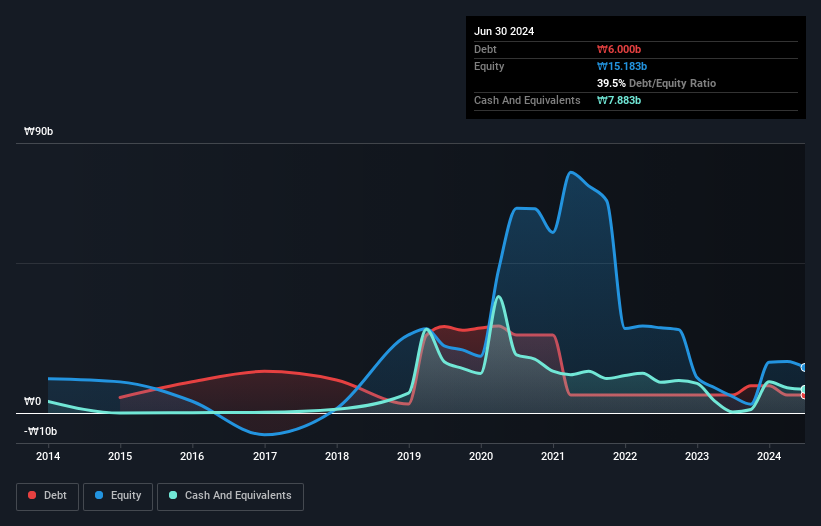Some say volatility, rather than debt, is the best way to think about risk as an investor, but Warren Buffett famously said that 'Volatility is far from synonymous with risk.' So it seems the smart money knows that debt - which is usually involved in bankruptcies - is a very important factor, when you assess how risky a company is. Importantly, LEMON Co., Ltd. (KOSDAQ:294140) does carry debt. But should shareholders be worried about its use of debt?
Why Does Debt Bring Risk?
Generally speaking, debt only becomes a real problem when a company can't easily pay it off, either by raising capital or with its own cash flow. Ultimately, if the company can't fulfill its legal obligations to repay debt, shareholders could walk away with nothing. However, a more frequent (but still costly) occurrence is where a company must issue shares at bargain-basement prices, permanently diluting shareholders, just to shore up its balance sheet. Of course, plenty of companies use debt to fund growth, without any negative consequences. The first thing to do when considering how much debt a business uses is to look at its cash and debt together.
Check out our latest analysis for LEMON
What Is LEMON's Net Debt?
The chart below, which you can click on for greater detail, shows that LEMON had ₩6.00b in debt in June 2024; about the same as the year before. However, it does have ₩7.88b in cash offsetting this, leading to net cash of ₩1.88b.

How Strong Is LEMON's Balance Sheet?
According to the balance sheet data, LEMON had liabilities of ₩7.74b due within 12 months, but no longer term liabilities. Offsetting these obligations, it had cash of ₩7.88b as well as receivables valued at ₩731.0m due within 12 months. So it can boast ₩872.8m more liquid assets than total liabilities.
This state of affairs indicates that LEMON's balance sheet looks quite solid, as its total liabilities are just about equal to its liquid assets. So while it's hard to imagine that the ₩93.9b company is struggling for cash, we still think it's worth monitoring its balance sheet. Simply put, the fact that LEMON has more cash than debt is arguably a good indication that it can manage its debt safely. There's no doubt that we learn most about debt from the balance sheet. But you can't view debt in total isolation; since LEMON will need earnings to service that debt. So when considering debt, it's definitely worth looking at the earnings trend. Click here for an interactive snapshot.
Over 12 months, LEMON made a loss at the EBIT level, and saw its revenue drop to ₩8.9b, which is a fall of 64%. That makes us nervous, to say the least.
So How Risky Is LEMON?
We have no doubt that loss making companies are, in general, riskier than profitable ones. And the fact is that over the last twelve months LEMON lost money at the earnings before interest and tax (EBIT) line. Indeed, in that time it burnt through ₩8.2b of cash and made a loss of ₩4.5b. With only ₩1.88b on the balance sheet, it would appear that its going to need to raise capital again soon. Overall, its balance sheet doesn't seem overly risky, at the moment, but we're always cautious until we see the positive free cash flow. There's no doubt that we learn most about debt from the balance sheet. However, not all investment risk resides within the balance sheet - far from it. We've identified 5 warning signs with LEMON (at least 3 which make us uncomfortable) , and understanding them should be part of your investment process.
If, after all that, you're more interested in a fast growing company with a rock-solid balance sheet, then check out our list of net cash growth stocks without delay.
New: AI Stock Screener & Alerts
Our new AI Stock Screener scans the market every day to uncover opportunities.
• Dividend Powerhouses (3%+ Yield)
• Undervalued Small Caps with Insider Buying
• High growth Tech and AI Companies
Or build your own from over 50 metrics.
Have feedback on this article? Concerned about the content? Get in touch with us directly. Alternatively, email editorial-team (at) simplywallst.com.
This article by Simply Wall St is general in nature. We provide commentary based on historical data and analyst forecasts only using an unbiased methodology and our articles are not intended to be financial advice. It does not constitute a recommendation to buy or sell any stock, and does not take account of your objectives, or your financial situation. We aim to bring you long-term focused analysis driven by fundamental data. Note that our analysis may not factor in the latest price-sensitive company announcements or qualitative material. Simply Wall St has no position in any stocks mentioned.
About KOSDAQ:A294140
Slight risk with worrying balance sheet.
Market Insights
Community Narratives




